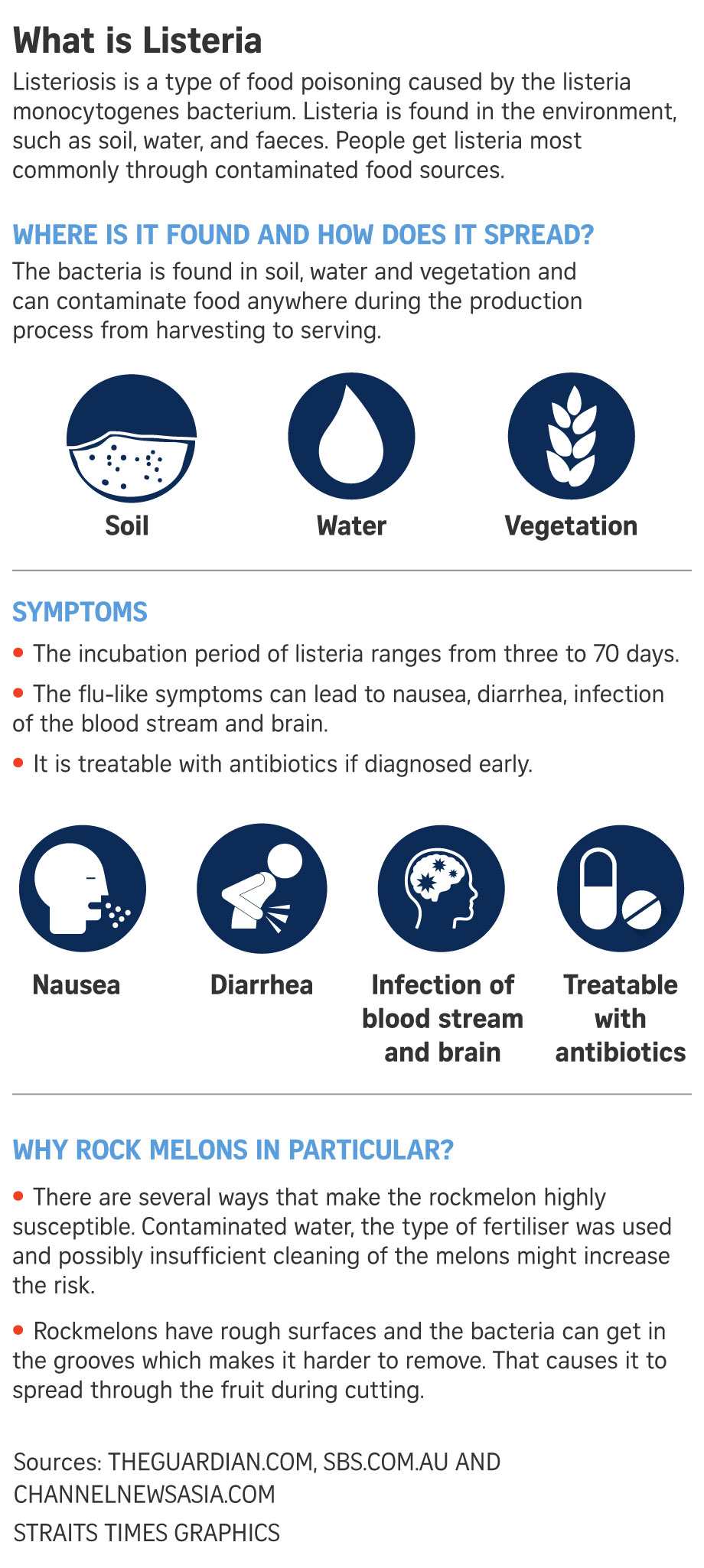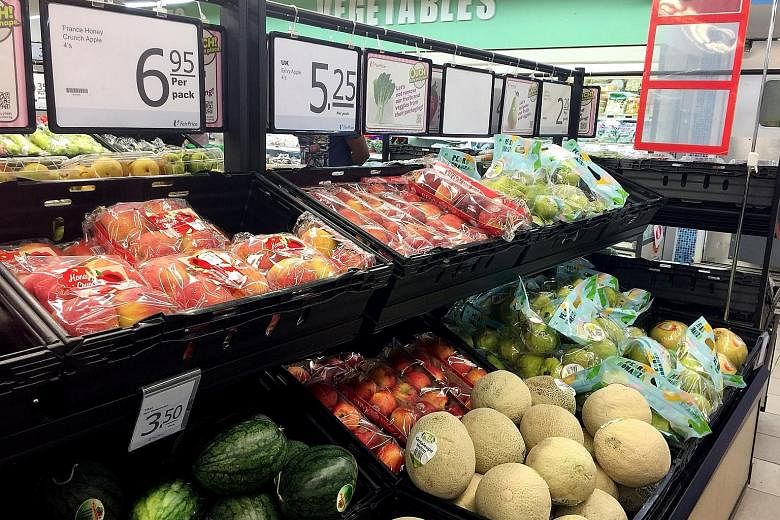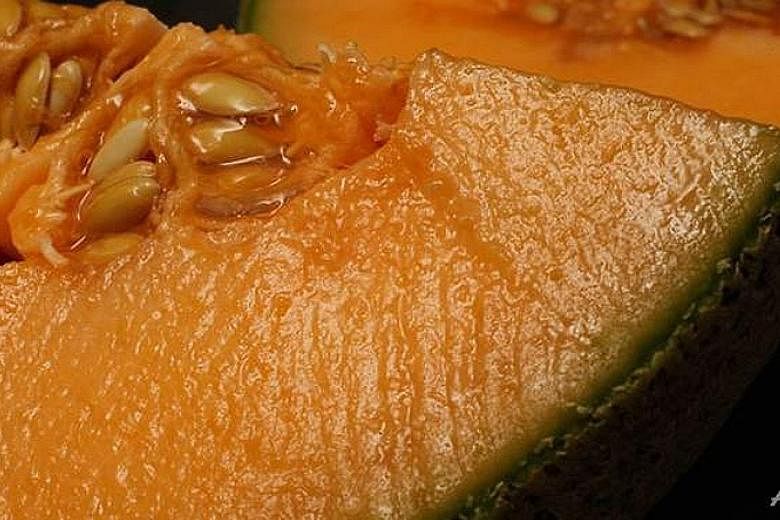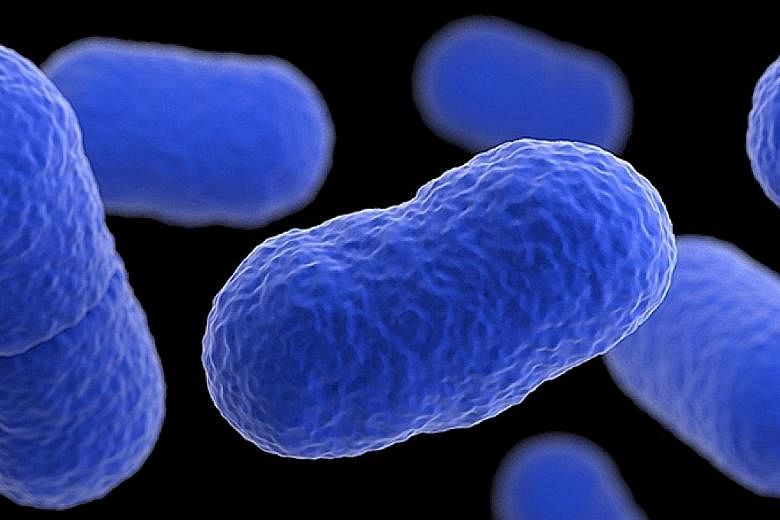A recall of rock melons imported from an Australian farm linked to a deadly listeria outbreak has been completed in Singapore.
Four people have died in Australia after eating the rock melons that were tainted with the listeria bacteria, and there are now at least 17 confirmed cases of listeriosis linked to the affected melons there.
Q What is listeria?
A It is a type of bacteria that causes listeriosis, a rare but deadly bacterial infection.
For most people, consuming food with the listeria bacteria does not cause illness. However, listeriosis can pose serious risks in those with weakened or compromised immune systems, such as newborn babies, pregnant women and the elderly.
Q What are the symptoms of listeriosis?
A They include diarrhoea and other gastrointestinal symptoms, followed by flu-like symptoms such as fever and muscle aches.
People with weakened or compromised immune systems are at risk of serious brain or heart infections, which may lead to death.
For pregnant women, listeriosis can cause complications in the foetus or newborn. This can lead to miscarriage, stillbirth, premature delivery, or life-threatening infection of the newborn, according to the US Centres for Disease Control and Prevention.
Q Where can the bacteria be found?
A Listeria is found in the environment, such as in soil, water or faeces, and can contaminate food items, especially raw or ready-to-eat foods.
These include raw or unpasteurised milk, raw meat and seafood, and fresh fruits and vegetables. Food contaminated by listeria smell, taste and look normal, according to the World Health Organisation.
The disease takes between one and four weeks to incubate. Anyone who develops symptoms within 70 days of eating the affected Australian rock melon is advised to seek medical attention.

Q How did the rock melons get contaminated?
A Vegetables may become contaminated through soil or manure used as fertiliser, said Dr James Yew, a consultant at the department of infectious diseases at Tan Tock Seng Hospital.
The fruit's rough surface also allows the bacteria to enter the grooves. This bacteria can then get spread throughout the fruit when cut, according to a Guardian interview with Professor Peter Collignon, an infectious diseases physician and microbiologist at the Canberra Hospital.
Q Which countries have experienced outbreaks?
A There have been sporadic outbreaks of listeria infections worldwide.
Recently, outbreaks have occurred in Australia and southern parts of Africa but they are unlikely to be related, said Dr Yew.
Since it began in January last year, an outbreak in southern Africa - the world's worst ever - has resulted in 948 reported cases of the bacterial disease and at least 180 deaths.
However, the infection remains relatively rare and does not occur frequently anywhere.
Q How can listeriosis be detected and treated?
A The bacteria can be detected in the blood or faeces of patients who show symptoms, said Dr Gail Cross, an associate consultant with the division of infectious diseases at the National University Hospital.
It can also be found in the cerebrospinal fluid of patients who have meningitis, which is one of the diseases that listeriosis can cause, she added.
If diagnosed early, listeriosis is treatable with antibiotics.
Young people with normal immune systems who have mild listeriosis often recover without specific treatment, said Dr Yew.
However, for newborns, the elderly, pregnant women and people who have weakened immune systems, the disease could result in permanent disability and death.
Q How can listeriosis be prevented?
A Food should be handled carefully before consumption.
For example, rock melons, which are typically eaten raw, should be thoroughly washed before they are eaten.
Q I bought rock melons during the affected period. what should i do?
A Consumers who suspect that they bought the affected melons should not consume them, the Agri-Food and Veterinary Authority (AVA) advised.
Those who do not feel well after eating them should seek medical attention.
Sheng Siong on Tuesday said customers who purchased implicated melons from its outlets should dispose of the fruits immediately.
As of yesterday, all rock melons from Australia have been removed from stores, and refunds will be provided with proof of purchase.
Both FairPrice and Cold Storage have also removed all Australian rock melons from stores.
Customers who purchased Australian rock melons from FairPrice on Wednesday can ask for a refund with a receipt.
Cold Storage is also offering refunds to customers who have receipts.
Q Is it safe to eat rock melons now sold in Singapore?
A A recall of the affected rock melons has been completed.
All unsold imported melons have since been removed, and there have been no further imports of the fruit from the affected Australian grower since then, said AVA.
As a precautionary measure, AVA announced on Thursday that it is in the process of recalling all rock melons from Australia.

ASK US A QUESTION
Send an e-mail to askST@sph.com.sg



